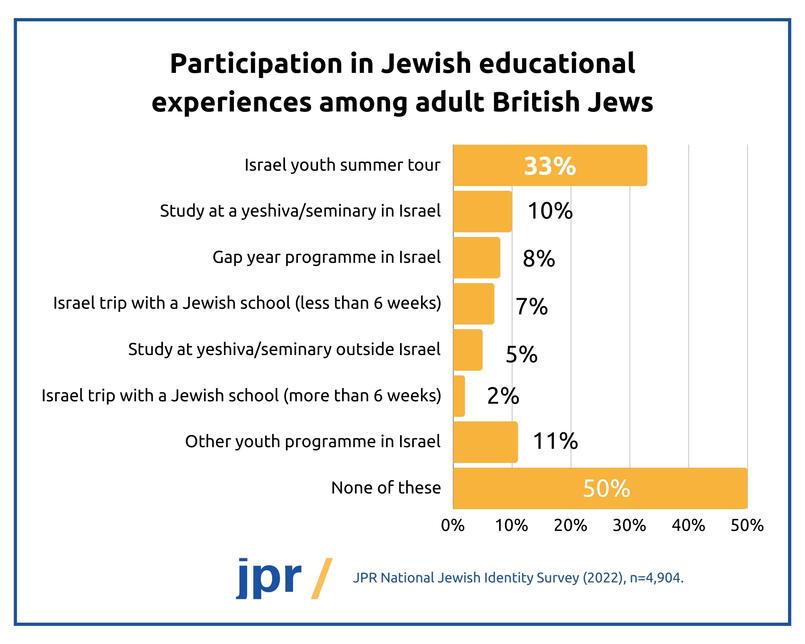Participation in Israel youth summer tours fell by 60% this summer. We need Israel to be a source of inspiration for the good of Jewish life everywhere; what should we do when it can no longer play that role?
Dr Jonathan Boyd
Dr Jonathan Boyd
Beyond the horrors of the October 7 attacks, there was something deeper about that day that left its mark on Jews everywhere. As Hamas committed its atrocities, many Jews had a momentary sense of what it feels like to be completely powerless and vulnerable, to be entirely at the whim of those who wish to exterminate us. For a brief moment, we had a taste of what it feels like to live in a world without a Jewish State.
It's not a familiar feeling. You have to be well over 80 years old to have any real memory of what life was like for Jews without the State of Israel. Indeed, we have become so used to the country’s existence that as much as the notion of Israel as a safe haven might resonate in some theoretical way, Jews rarely ‘flee’ to it anymore, certainly not from the UK. About two in every thousand British Jews make aliyah every year, and that rate has remained steady for decades. Despite concerns about rising antisemitism, we’re not exactly running for the Judean hills.
Instead, we have increasingly come to see Israel as the ‘classroom’ of the Jewish People, a concept first championed by the former Chief Rabbi, Lord Sacks z”l. As he argued thirty years ago, where Israel once saved Jews, now it would save Judaism. He saw it as the place where young people could have a ‘total Jewish experience’ – to learn about their Jewishness and bring back their passion to help revive Jewish life in the Diaspora.
Perhaps the most significant educational endeavour to emerge from this concept was ‘Birthright’ – the all-expenses-paid ten-day Israel experience programme for young adults that has now taken over three-quarters of a million Diaspora Jews to Israel in the past 25 years.

The concept of the Israel experience programme goes much further back than that – it actually pre-dates the establishment of the State in 1948. Israel has long been our classroom – indeed, half of all adult British Jews have been on an educational trip there, and quarter has been on more than one. And chief among these is the Israel youth summer tour, which a third of all adult British Jews has now participated in.
Research demonstrates that the summer tour actually has a somewhat limited long-term impact on our Jewish identities, certainly as a one-off experience. It seems to become genuinely effective only when it is embedded in the broader set of Jewish educational experiences. It is far more impactful on young people who were involved in a youth movement before their summer tour and continue to be afterwards than those who simply ‘go on tour’ one summer. Our Jewishness takes time to evolve; there is no single silver bullet.
Still, research also demonstrates that long-term Israel programmes – i.e. those lasting several months at least – are more impactful than any other significant Jewish educational experience, including Jewish schooling. Living intensively in a fully Jewish milieu as part of a group for an extended period leaves a lasting impression on who we become. And, of course, those participating in such schemes are often former summer tour participants. Short-term programmes lead to long-term ones.
Yet the ‘Israel as classroom’ concept has been hit hard by the war. Israel tour participation numbers this summer were down by some 60% compared to summer 2023. Moreover, coming so soon after summer tours were also severely hit by the pandemic, the number of young people who went on tour in the past five years is barely half that who did so in the previous five.
Thus, the damage inflicted on Israel and the Jewish People recently extends beyond the physical and psychological realms and into the educational one. It is difficult for Israel to serve as the classroom of the Jewish People when Diaspora Jews are unable or unwilling to go.
Much depends now on how community leaders manage this challenge – whether they see the recent lean summers as mere blips or as a portent of things to come, look for a new educational paradigm to stand alongside or replace the ‘Israel as classroom’ one, or double-down on it in the hope of better times ahead. This issue matters deeply. We need Israel to be a source of inspiration for the good of Jewish life everywhere; what should we do if it can no longer play that role?
Executive Director
Executive Director
Jonathan has been Executive Director of JPR since 2010, having previously held research and policy positions at the JDC International Centre for Community Development in...
Read more